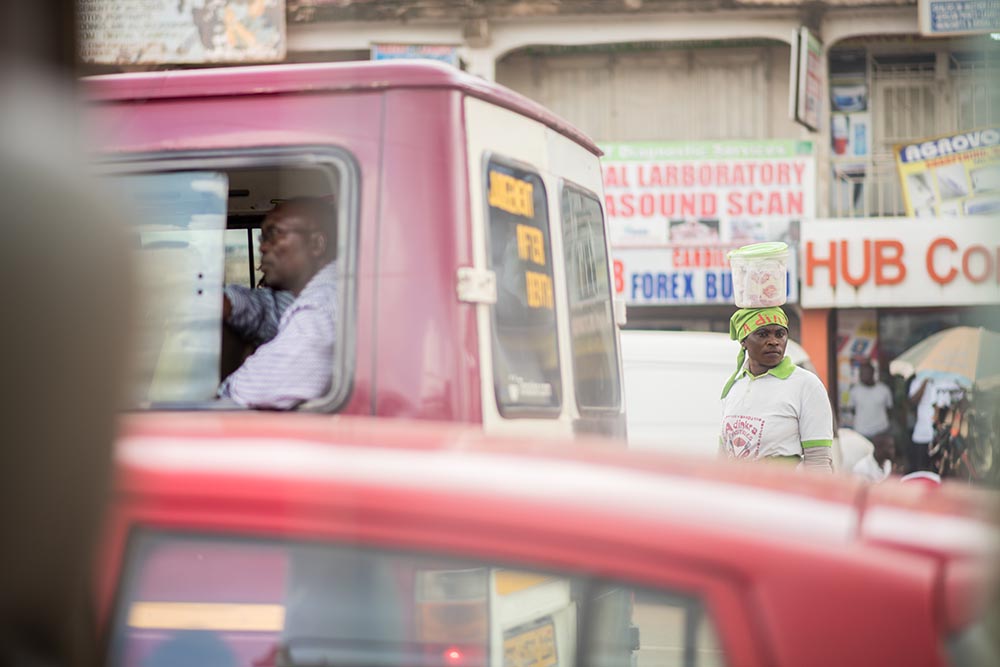As my first month in west Africa comes to a close, I’m finding things are beginning to settle. Flying into Accra with Morgan, we arrived in the night to an airport crowded with people and humidity. Eventually we made it through a long customs line and received a very minor taste of the well-orchestrated chaos of Ghanaian traffic when Doc Williams (a local professor) and Leslie brought us to our new home in nearby East Legon, a province of Accra.
All of us students, 15 in all, spent the next week travelling and being cooked for and bussed around Accra while becoming acclimated to the city. On June 29th, we began our internships and the (much appreciated) babying dwindled to a slow feed.
As most of us are getting familiar with navigating the physical and social constructs of Accra, things are starting to normalize. Though they remain adorable, it’s no longer surprising to see a small herd of goats straddling sidewalks alongside passersby and vendors, for example, or posted up outside of our house at any hours of the day. Unfortunately, it’s also not surprising anymore to see the piles of garbage that sit among the grass they munch on, nor the plastic bags or water bottles that float down the deep gutters lining the streets of Accra.
Still, despite Ghanaians’ enthusiastic tendencies to compost everything, organic or otherwise, a certain harmony saturates the streets of Accra at peak hours unlike anything in Oregon. Traffic will seize any opportunity to make progress on the streets, but not in a spiteful way, instead more like aggressive chess. Meanwhile dozens of hawkers weave in between cars and sell goods to people through rolled down windows–anything from donuts and bags of water to loose windshield wipers and toilet paper. On the sidewalks, little stands offer fresh mangos and grilled chicken parts, along with phone data cards and sodas. Pedestrians wear standard western garb, along with more vibrant, traditional African clothing, often bright with pastel colors and geometric patterns. Above them, storefront signs advertise “His Holiness Automotive Parts” or “Divine Grace Hair Stylings,” which are weirdly accompanied (about a third of the time) by the same early 2000s photo of Ludacris with some glitzy sideburns.
Always within earshot of the shops are trotros, bench-seated vans usually stuffed with about 20 people. They speed down the road, slowing at stops to drop off and pick up passengers while the mate hangs off of the door with a fistful of loose bills shouting the buses’ route like an auctioneer, working with efficient motion. A ride to work on one of the buses, usually stuffed between a row of people and the accompanying collective body heat filtered through 75% humidity, costs about 30 cents American.
Work at my internship, the Daily Guide newspaper, is fun. There’s often a lot of shouting in a local dialect called Twi that I mostly don’t understand, but the other reporters are kind and bring me out to cover stories, sharing bylines and concepts. One of my first experiences there was editing the copy of a story with another reporter, Melvin. Although most people I’ve met here speak English, there’s still a language barrier, and editing paragraphs between it was interesting. Communication was strained at first, especially in a job that’s based on sharing ideas and specific details. Adjusting and becoming comfortable within the newsroom, however, is satisfying, much like figuring out how to transact with the trotro mate using as few words as possible, or becoming competent at the super-cool snap handshake that is common here, which tricks locals into thinking I’m cooler than I am.
Speaking of locals, some have tried to take advantage of my (obviously) foreign nature, trying to sell me identical, hand-carved wooden giraffes or masks, (“My friend, I give you a good price!”) or rip me off on cab fare. But most are genuinely eager to help me figure out Ghana and enjoy its merits. A couple weeks ago, Shirley, Megan, and I overshot our stop, and a random dude walked us 5 minutes to the right bus and made sure the mate knew where to drop us off. Also, one time I only had to stand at the bus stop for about 30 minutes trying (in sweaty failure) to find the right bus home before someone nearby asked where I was going and with a smile told me what the trotro mate would shout as it comes toward the stop (“Adenta Medina, Adenta Medina, x3 at triple speed).
People here, for the most part, are like that. They won’t assume you don’t know how to do anything. Only after a triumphant display of futility will they help you out, poking fun and informative. There have been many stretches where I’ve felt like a child learning how the world works all over again, which isn’t so bad when said stretches are followed by the savory bliss of figuring something out, almost as tangible as the roasted chicken and spiced tomato rice I’ve been eating here every day.
Finally, a couple of haikus to express my current feelings.
mail true detective
season 2, please, on flashdrive
for I miss it so
and some chipotle,
a huge box of burritos
carnitas, so fine


